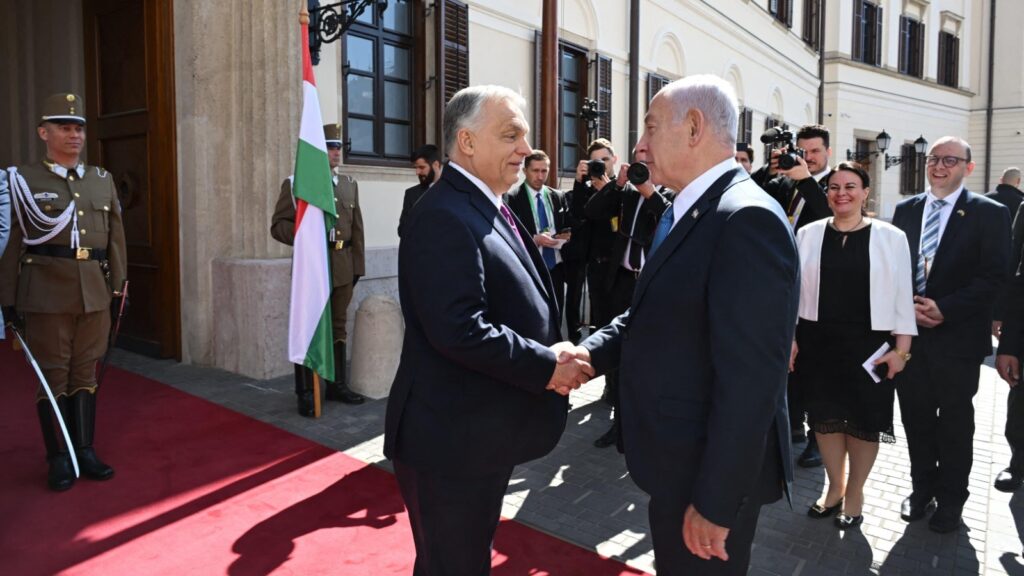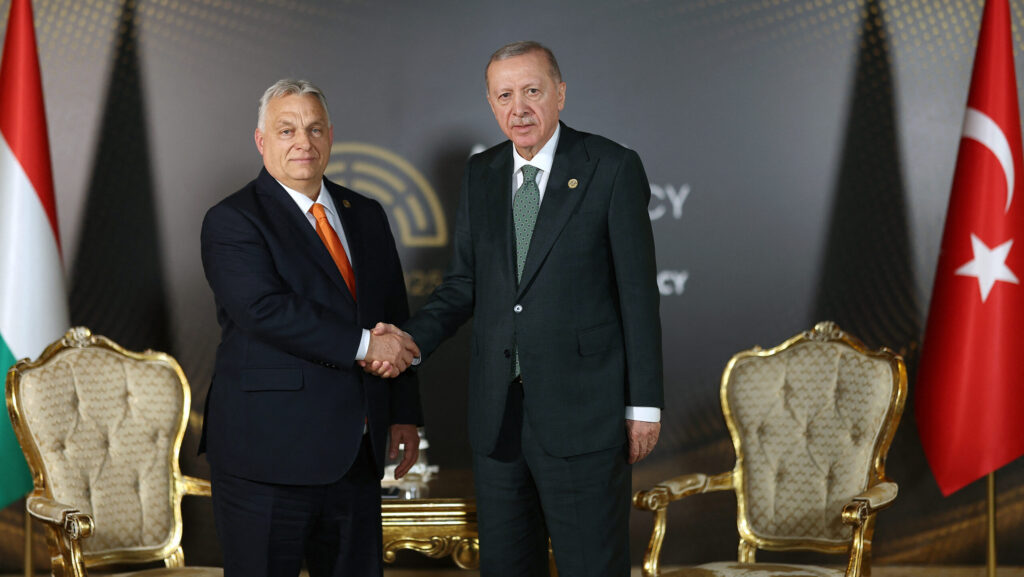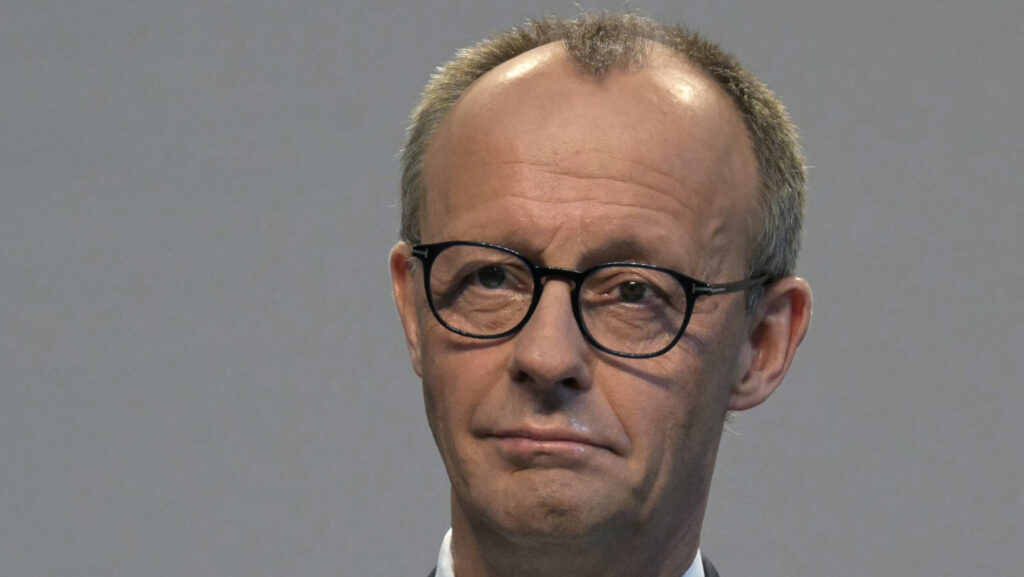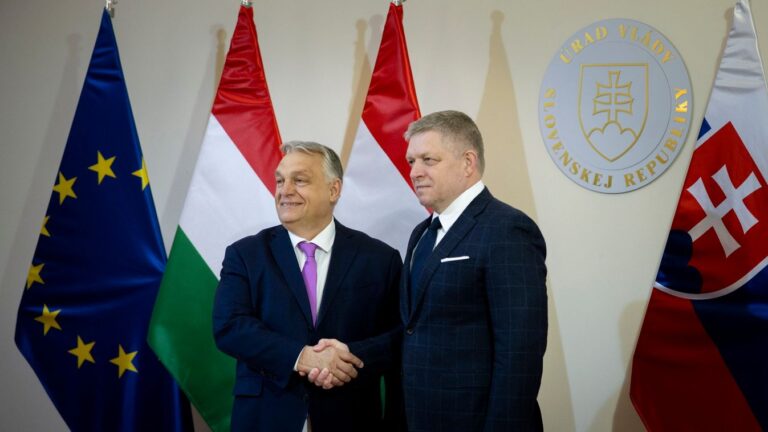On Wednesday, the Danube Institute hosted the book launch of the latest work of Balázs Orbán, the political director of the Hungarian Prime Minister, titled Hussar Cut: The Hungarian Strategy for Connectivity.
In his opening speech, Tamás Dezső, Chairman of the Board of Trustees of the Batthyány Lajos Foundation, pointed out that the fruits of many years of work have been reaped, and an increasingly strong and productive conservative intellectual circle has emerged in Hungary. He stated that Balázs Orbán’s book represents a milestone in Hungarian conservative thinking, which has now reached the high level represented by Hungarian conservative politics.
Balázs Orbán commenced his presentation with a brief anecdote detailing the origin of the book’s title. The political director reminisced that selecting the title proved to be the most challenging aspect of writing the book, yet he expressed utmost satisfaction with it as it perfectly aligns with the content. Hussars, initially Hungarian light cavalry units, frequently employed a manoeuvre known as the ‘hussar cut,’ which contributed significantly to Hungarian victories in numerous battles. ‘It’s a decisive, courageous, unexpected, albeit somewhat risky move that can overturn the outcome of a battle, presenting a winning opportunity for the Hungarians,’ Orbán explained. He asserted that this description aptly
mirrors the evolution of Hungarian foreign policy amidst the shifting global order.
The latter—the transformation of the world order—constitutes the first part of the book. The author emphasized that currently, the outcome of the ongoing geopolitical, social, and economic processes remains uncertain. According to Mr Orbán, the crucial point is that Hungary lacks the ability to directly influence these processes. Therefore, the pivotal question is: how should we respond to them?
Balázs Orbán underlined that the primary driving force behind the old world order was globalization, propelled by neoliberal ideology. This profoundly influenced our perceptions of the world, our approach to trade, governance, and societal structures. The fundamental concept was that Western countries, spearheaded by the United States, would lead this world order, while the rest of the world, experiencing economic growth due to globalization, would integrate into the Western sphere of influence. This scenario, Orbán noted, was envisioned as the ‘end of history,’ echoing Francis Fukuyama’s renowned theory that has shaped the post-Cold War world order.

However, this scenario has not unfolded as anticipated. Over the past two decades, the global community has witnessed a loss of faith in the neoliberal strategy due to a myriad of interconnected reasons. As the political director highlighted, the purpose of the book is not to provide definitive answers to these questions, but rather to propose a strategy for Hungary to effectively navigate and respond to these transformations.
Adapting to the Changes
Hungary’s geographical constraints fundamentally restrict its manoeuvrability: it is landlocked within the Carpathian Basin, lacking significant natural resources, a robust military, or a substantial internal market. However, the key to Hungary’s success lies in its creation of an open economy, effectively transforming the disadvantages of its geography into advantages. Through this approach, Hungary has cultivated one of the world’s most complex economies, with a remarkable focus on exports.
As Mr Orbán highlighted, an integral component of this strategy is visibility, aimed at showcasing the country’s advantages and ambitions. Therefore, it is of utmost importance—and a significant achievement—that Hungary consistently garners attention in the international media.
As evident from the book’s title, the Hungarian strategy is centred around connectivity, aiming to uphold its role as a bridge in both the new and old world orders. Hungary’s geographical location, cultural traditions, and historical background make it ideally suited for this role. Consequently, the
current global trends towards isolationism and bloc formation pose significant challenges for the country.
As the anniversary of the Hungarian War of Independence in 1848 draws near, Mr Orbán, akin to the revolutionaries of the past, outlined the main ideas of the Hungarian connectivity strategy in 12 points. Following these points, Orbán believes, will enable the country to capitalize on the transformation of the world order:
- Don’t give up your values, build on them;
- Build coalitions;
- Invite as many investors as possible;
- Let your national champions be decisive;
- Have sectors that serve as breakout points;
- Have developed infrastructure;
- Participate actively in organizing your own region;
- Build for the next generation;
- Make your country a meeting point;
- Establish security;
- Base your foreing policy on national interest;
- Support peace!
‘Walking Hungarys of Our Own Country’
The second half of the event was a roundtable discussion with Balázs Orbán; Patrick Deneen, Professor of Political Science at the University of Notre Dame; and Rod Dreher, Director of Network Project at Danube Institute.
During the panel discussion, the participants delved into the concept of ‘post-Christianity’. Balázs Orbán highlighted that Christianity stands as one of the most successful connectivity endeavours of Western civilizations, exerting a profound influence on politics and economic structures throughout European history. ‘With the rise of progressive ideology, the West is attempting to get rid of Christianity,’ the political director remarked. He emphasized that this move constitutes a grave error, as Christianity has historically served as the cohesive force binding Western nations. Orbán pointed out Hungary’s divergence from other Western countries in this regard, which is why it is so attractive to American Republicans, for instance.
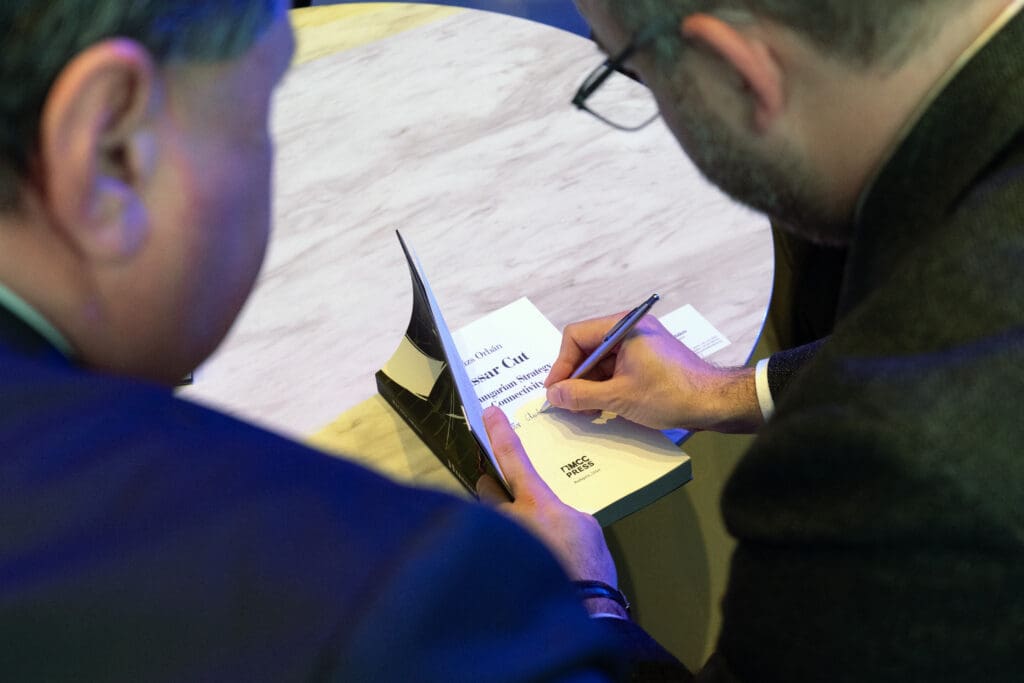
Agreeing with this sentiment, Rod Dreher stated that there have been numerous attempts to supplant normative Christianity. However, as we are witnessing in the US currently, these efforts are proving unsuccessful. According to him, those who come to Hungary praise the country because it has managed to maintain a sense of normalcy. This normalcy arises from the fact that neither society nor political leadership reject Christianity.
‘The West either finds its way back to Christianity or it ceases to exist,’
Dreher opined.
Patrick Deneen suggests that there is much to learn from Balázs Orbán’s book and from Hungary, especially in the United States. As he metaphorically stated, ‘just as an elephant can learn from a mouse,’ American Republicans are also observing Hungarian politics and society closely. Deneen argues that there are currently two paths open to the Western world. The first, along the lines of Fukuyama’s theory, envisages a completely homogeneous world in which there are no nation-states, no borders, no cultural traditions, no religious differences, and all antagonisms are eliminated. This is the neoliberal vision that compels countries to join them, even by force. The other way is bloc ideology, which divides the world into friends and foes, with no passage between the two camps. However, Deneen argues for a third way, based on cooperation among sovereign nation-states with diverse cultural and historical traditions.
Balázs Orbán noted that there is more and more talk about the ‘final battle between democracies and autocracies,’ in which individuals must choose sides; otherwise, dissenters face threats of retaliation. In his view, this is reminiscent of the Marxist worldview that progressives have embraced fully.
Rod Dreher agreed, pointing out that it is partly because of the neoliberal agenda that the US is so divided today. Patrick Deneen added that the progressive side is doing everything it can to win the ideological war and silence anyone who disagrees with them. He jokingly said that in the United States, non-progressive, non-mainstream thinkers, like him, are ‘walking Hungarys of our own country.’
In conclusion, Balázs Orbán stressed that all is not lost in Europe and that the countries of the continent have not yet unanimously decided whether to pursue the bloc policy advocated by Washington or to adopt an autonomous, separate approach in the changing world order.
Related articles:


